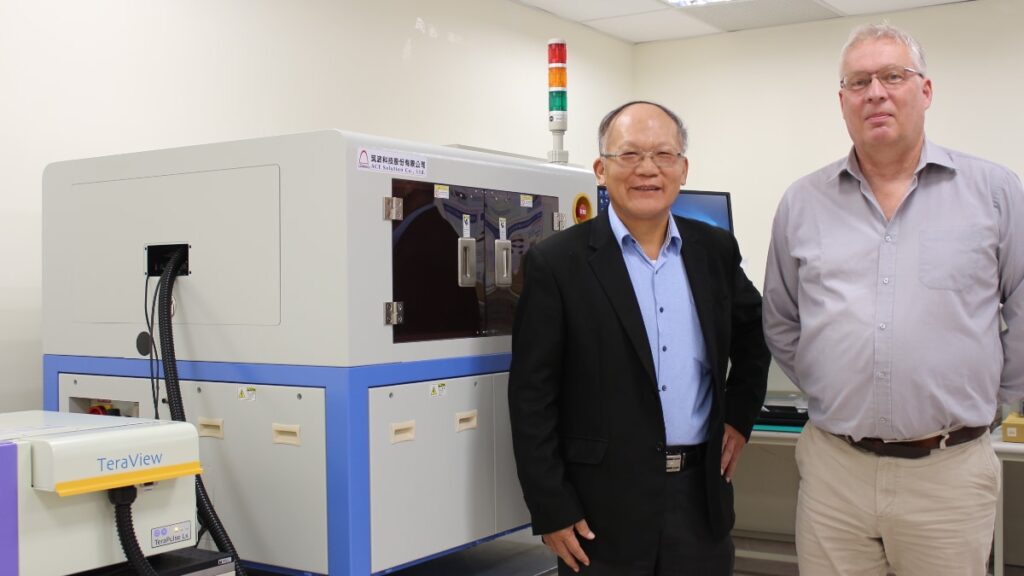
Newsletter | April 2023
TZ6000 – a nondestructive wafer quality measurement tool for the compound semiconductor industry

Hsinchu, Taiwan, February 2023 – ACE Solution, the leader and the provider in customized test solutions to meet customer needs in electrical components, devices and system manufactures, is pleased to announce the product launch of the TZ6000 – a nondestructive wafer quality measurement tool for the compound semiconductor industry. Incorporated with TeraView’s TeraPulse Lx technologies, achieves nondestructive wafer quality measurements of thickness, refractive index, resistivity, dielectric constant, surface/subsurface defects at selected positions and whole wafer scanning map.
Read the full press release here.
New Members of Our Team
Select Papers
Detecting Crystallinity Using Terahertz Spectroscopy in 3D Printed Amorphous Solid Dispersions
Abstract
This study demonstrates the applicability of terahertz time-domain spectroscopy (THz-TDS) in evaluating the solid-state of the drug in selective laser sintering-based 3D printed dosage forms. Selective laser sintering is a powder bed-based 3D printing platform, which has recently demonstrated applicability in manufacturing amorphous solid dispersions (ASDs) through a layer-by-layer fusion process. When formulating ASDs, it is critical to confirm the final solid state of the drug as residual crystallinity can alter the performance of the formulation. Moreover, SLS 3D printing does not involve the mixing of the components during the process, which can lead to partially amorphous systems causing reproducibility and storage stability problems along with possibilities of unwanted polymorphism. In this study, a previously investigated SLS 3D printed ASD was characterized using THz-TDS and compared with traditionally used solid-state characterization techniques, including differential scanning calorimetry (DSC) and powder X-ray diffractometry (pXRD). THz-TDS provided deeper insights into the solid state of the dosage forms and their properties. Moreover, THz-TDS was able to detect residual crystallinity in granules prepared using twin-screw granulation for the 3D printing process, which was undetectable by the DSC and XRD. THz-TDS can prove to be a useful tool in gaining deeper insights into the solid-state properties and further aid in predicting the stability of amorphous solid dispersions.
Full article available here.
Formulation-dependent stability mechanisms affecting dissolution performance of directly compressed griseofulvin tablets
Abstract
During drug product development, stability studies are used to ensure that the safety and efficacy of a product are not affected during storage. Any change in the dissolution performance of a product must be investigated, as this may indicate a change in the bioavailability. In this study, three different griseofulvin formulations were prepared containing microcrystalline cellulose (MCC) with either mannitol, lactose monohydrate, or dibasic calcium phosphate anhydrous (DCPA). The tensile strength, porosity, contact angle, disintegration time, and dissolution rate were measured after storage under five different accelerated temperature and humidity conditions for 1, 2, and 4 weeks. The dissolution rate was found to decrease after storage for all three batches, with the change in dissolution rate strongly correlating with the storage humidity. The changes in physical properties of each formulation were found to relate to either the premature swelling (MCC/DCPA, MCC/lactose) or dissolution (MCC/mannitol) of particles during storage. These results are also discussed with consideration of the performance- and stability-controlling mechanisms of placebo tablets of the same formulations (Maclean et al., 2021; Maclean et al., 2022).
Full article available here.
Upcoming Events & Conferences
TeraView will be attending the Battery Show Europe in Germany as part of the UK pavilion. Watch a short presentation above by TeraView’s VP Business Development, Andy Bell, regarding the event – click the image above to watch a brief overview of the event by Andy.
The Battery Show Europe will take place in Stuttgart, Germany, between 23-25 May 2023.
Full details can be found here.
Would you like to partake in an online workshop?
TeraView are looking at conducting online workshops throughout the year.
Contact us if you are interested

